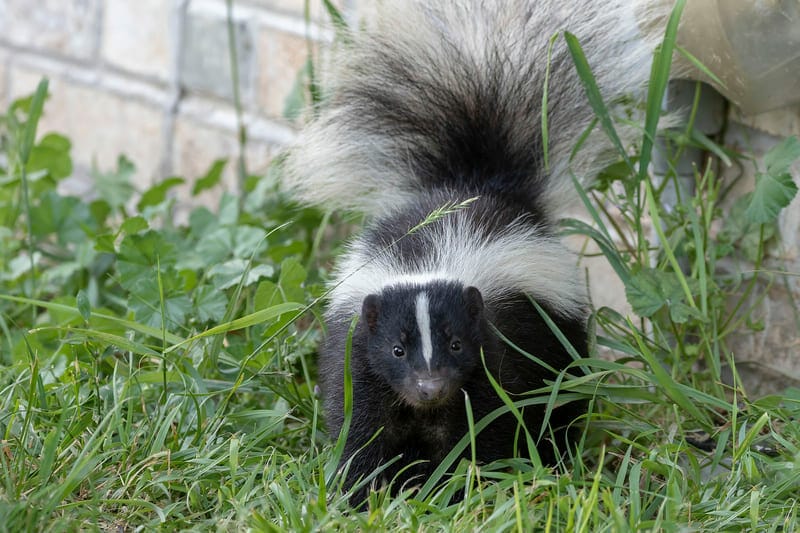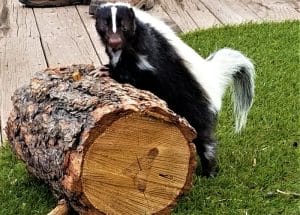No one expects they’ll ever have to Google ‘skunk removal services.’ But when you see a mom and her youngsters camping out under your porch and remember that you have a curious dog or child, you might not have much choice. Not only is their spray infamous, but their rigorous digging ability can damage your lawn and even the home itself.
Fortunately, you don’t have to carry on hoping that you’ll avoid an encounter. At Bad Company Wildlife Eviction, our skunk removal services are referred to as ‘evictions.’ Once they’re off your property, we take steps to ensure that they don’t return. This article explains how you should respond if a skunk moves in and how to schedule a humane wildlife eviction in Hamilton.
All About Skunks
Skunks, who are easily distinguished by their characteristic black and white stripes or spots, are known to produce a foul odor when frightened. Skunk spray is mostly feared for its smell, but it can also cause intense discomfort if it gets into the eyes of humans or other animals. Fortunately, skunks rarely use this potent defense and provide plenty of benefits to the areas where they live.
Since skunks are nocturnal, they are most active at night. Winter is when they are most inactive, gathering in communal dens for warmth during the coldest months. For the remainder of the year, skunks are usually solitary, living and foraging on their own unless it’s mating season, which usually occurs in winter.
Sixty days after mating, females have litters consisting of one to seven babies, with baby season being late April through early June. During the 60-day gestation period, skunk moms are looking for a nest, and sometimes the warmth and darkness of the area under your deck or foundation can be too much to resist.
Some cool facts about skunks:
- Skunks belong to the family Mephitidae, which means ‘stink.’
- A group of skunks is known as a surfeit.
- A skunk’s spray can reach a range of up to 10 feet, and its odour can travel up to 1.5 miles. (However, before spraying, skunks usually try to scare off a predator with an elaborate warning dance that consists of stamping their feet, arching their tail forward over their back, and hissing.)
- Skunks are known to eat poisonous snakes such as rattlesnakes because they are immune to snake venom.
- Skunks eat wasps and honeybees, which is why they attack beehives.
- One out of every 1000 people cannot detect skunk spray!
Last of all, skunks are popular pets in some locations. Although it’s illegal to own them in Canada as well as 33 states and territories, other jurisdictions allow you to apply for a permit to keep one as a pet. According to their owners, skunks are intelligent, curious creatures with individual personalities.
How Do You Know When Skunks Have Moved In?
One of the big indicators is seeing a lot of holes on your property. Skunks are excellent diggers because of their strong forefeet and long nails. They dig holes in lawns and gardens to eat grubs, earthworms, and other bugs. They may even burrow underneath buildings by entering foundation openings if no other shelter is available.
Skunks burrow underneath trees in the wild. In urban areas, however, they will burrow underneath solid foundations, causing thousands of dollars in damage if structural elements shift or crack. This is another reason why you might want to look into skunk removal services to evict them sooner rather than later.
How to Keep Skunks Away From Your Property
One of the best ways to discourage skunks from moving in is to eliminate their food sources. Being omnivorous, they eat practically anything. This is one of the reasons why they’re commonly found near human habitations: our garbage is their all-you-can-eat buffet. If there’s nothing on the menu, they’ll take their business elsewhere (and maybe even ask to speak to the manager).
After skunk removal services are complete, try the following strategies to prevent another tenant from moving in:
- If you have any kind of fruit tree on your property, gather fallen fruit off the ground regularly.
- Place a tray under bird feeders to keep seeds off the ground.
- Store garbage cans in a shed or the garage.
- Only use lockable garbage cans. Although not as dextrous as raccoons, skunks are still pros at lid removal.
- Don’t leave dishes of pet food outside.
- If you keep chickens, secure the coop, as skunks are fond of chicken eggs.
- Fix leaky outdoor spouts to prevent access to a water source.
- Install electric fences around gardens.
You also want to make sure that all the buildings on your property are skunk-proof. You can do this by:
- Close off any gaps leading under your porch or deck.
- Clear away any lumber or other materials stacked in your yard.
- Cut down bushes and low branches, which can also present some shelter.
Should You Try A DIY Eviction?
Instead of arranging for skunk removal services, you may be tempted to evict them yourself. While there’s no shortage of online advice on how to get the job done, we strongly recommend that you call for wildlife eviction in Hamilton instead.
- If you separate a mother skunk from her babies, they might not survive.
- You may not have access to professional eviction resources like one-way doors. These resources allow the skunk to leave but won’t let them back in.
- Trapping and removing the skunks is only a temporary solution. For endangered species, moving them over 1km is illegal.
Bad Company Wildlife Eviction has the extensive experience and caring personnel needed to accomplish a safe and effective skunk eviction. In addition to ensuring that mother and babies move out together, we provide you with tips that can prevent future unwanted visitors. If you have any questions or concerns following an eviction, feel free to contact us at any time.
How Does Humane Wildlife Eviction in Hamilton Work?
When you’ve got skunks for tenants and they’re determined to stay put, Bad Company Wildlife Eviction can come out to your home, inspect the property, and provide you with a no-obligation estimate for eviction. If you decide to go ahead, we will:
- Install a one-way skunk exit on the point of entry.
- Install preventative screening around the perimeter of your porch, deck, or shed to prevent the skunks from getting back in.
Once the skunks are gone, our wildlife technicians will come back to remove the one-way exit and seal the entry permanently.
If any babies are on the premises, we gently remove them from the nest and put them in an insulated and heated box near the one-way door, making it easy for Mom to carry them one by one to their new digs.
You Don’t Have to Feel Guilty About Our Skunk Removal Services!
If you’re looking for humane wildlife eviction in Hamilton, you’ve come to the right place. At Bad Company Wildlife Eviction, we specialize in getting skunks and other unwanted tenants out of your property and helping ensure that they stay out. No more potentially smelly encounters day or night. For more information or to schedule your no-obligation estimate, call 1-855-880-9860.



